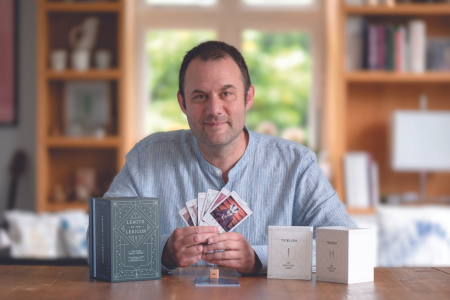-
QUALIFICATIONS
- For Linguists Worldwide
- For UK Public Services
- Preparation
- Policies & Regulation
-
MEMBERSHIP
- Join CIOL
- Membership grades
- NEW for Language Lovers
- Chartered Linguist
- Already a member?
- Professional conduct
- Business & Corporate Partners
-
ASSESSMENTS
- For Second Language Speakers
- English as a Second Language
-
TRAINING & EVENTS
- CPD, Webinars & Training
- Events & Networks
- CIOL Mentoring
-
NEWS & VOICES
- News & Voices
- CIOL eNews
- CIOL Awards
- The Linguist
- Jobs & Ads
-
RESOURCES
- For Translators & Interpreters
- For Universities & Students
- Standards & Norms
- CIOL & AI
- APPG
- In the UK
- UK Public Services
- Find-a-Linguist
An interview with Joshua Blackburn
By Anita van Adelsbergen
The inventor of the languages game League of the Lexicon discusses his passion for words and why it is all about being curious. He explains all to CIOL Council member Anita van Adelsbergen.

Joshua, you’re a game publisher, a marketing specialist, a photographer and designer, you’ve co-founded an art gallery and written a book on climate change. That’s a fascinating career…
You forgot about the book I made about launderettes! Even though it looks like there is no coherence whatsoever about my work, what all of this reflects is a sense of curiosity. I am a curious person. I ran a design agency for 14 years, specialising in ethical and social organisations. After 14 years I started feeling a bit restless so I decided to do something different. My wife was working in photography at the time and had been looking into setting up a photography gallery, so I set that up with her as it sounded like a fun thing to do. I started doing more and more photography myself and worked on this project photographing launderettes for a year.
It may sound silly but I have always been fascinated by London launderettes, and photographing these vanishing businesses became an obsession. The leap from launderettes to League of the Lexicon might seem odd, but it reflects my spirit of curiosity. I am not a lexicographer or a linguist myself, but I love words as they are inherently democratic. Words are there for everyone.
Do you have a similar curiosity for vanishing or revived languages as you do for vanishing businesses?
Absolutely. On the one hand you can look at languages as simply a tool for communication, and on the other, you can look at language in the sense of the people who are speaking the language, the region in which it is spoken, the culture it is embodying and expressing.
So how did you come up with the game?
As I was home schooling my two boys during lockdown I was deeply depressed by what they were doing in English at school. It was so joyless – endless comprehension exercises that nobody enjoys. I wanted them to discover how extraordinary language is, to inspire a sense of curiosity. So I came up with little games for them.
I started by looking at a whole pile of games and identifying the things that made them successful. I really liked games that had a narrative, a face or personality to them. I wanted it to have a story behind it. So that’s how I came up with League of the Lexicon. But what started as a game for kids quickly grew into something much more grown up. It was important that the game remained inclusive, which is why the question cards come in two levels of difficulty, but even knowledgeable word lovers should be prepared for some tough questions!
Why did you decide to call it League of the Lexicon?
I had this idea of character cards based on famous lexicographers competing to collect artefacts associated with great writers and languages throughout history. I liked the idea that they were part of some mysterious ‘league’, as in The League of Extraordinary Gentlemen, and the name evolved from that. It felt quirky and mysterious.
Do you think you would have invented the game if Covid hadn’t happened?
Well, I am a sort of ‘serial maker’; I like making stuff. I felt that there was a huge interest in words and languages – just look at a game such as Scrabble or someone like Susie Dent. I know lockdown was a difficult time for a lot of people, but for me it was a creative and fertile period. This project would not have happened without it.
It’s true people have an interest in languages, but as translators we see companies replacing us with AI, so this interest doesn’t always shine through…
I think there is a difference between the functional need (i.e. ‘I need to have this text translated; how can I do that?’) versus the curious and wondering side of languages as a bigger subject – as something to explore and discover and ask questions about.
These digital solutions seem to provide a convenient way of getting the job done, but it’s not until you start using a translator that you appreciate the craft of linguists.
Of the collaborators you worked with, who most surprised you?
I contacted about 150 people – academics, lexicographers and authors who knew about words and languages – to see if they wanted to send in a question. At least 50% gave us one question. But there were some who sent in more. I also worked with four illustrators to have the design as perfect as possible.
We received questions from the likes of Michael Rosen, Ben Schott, Simon Horobin, Lynne Truss and many more. Sometimes, these contributions led to exciting things. Jonathon Green, the world’s foremost slang lexicographer, and Gaston Dorren, a polyglot language expert, were big fans of the game and this led to conversations about authored special editions. Now we’re in production of a Global Edition written by Gaston and Jonathon’s Slang Edition, due for release in September. It’s amazing how it’s grown. So many wonderful people contributed. If any readers are interested in being part of it, please do reach out.
As a designer and photographer, you paid a lot of attention to the aesthetics of the game. Do you think we could spark an interest in languages among more people by using attractive visuals?
Yes, absolutely. It could definitely help, but it’s not just about design. Someone like Susie Dent isn’t about design; she is about making it more accessible, beyond academia. She is basically telling the world about it. That is the real challenge. It is about accessibility, and design could be a part of that.
Is there a language you would like to learn yourself?
There are so many things I’d like to learn but if I had to choose one language it would be Portuguese. I now have Portuguese citizenship thanks to my family roots as a Sephardic Jew, so it may be good to learn more about the language.
What are your plans now?
I might come up with more editions, like the Slang and Global editions. I have also written a Junior Edition for younger players.
And, finally, how would you persuade a young person to engage with languages?
I feel that here in England we’ve got a problem with teaching languages and with caring for them. It’s a mixed blessing that everybody worldwide speaks English. There is a real cultural problem with foreign languages in this country that is fundamentally different in Holland or Spain, for example. In many countries learning languages is not optional.
To address the question of language learning in the UK we need to change the way it is set up and we really need young people to help in this effort. Coming back to my sense of curiosity, that is where it starts for me: a sense of curiosity and wonder and love of languages. It has to start there.
For your chance to win a game, send a letter for publication to linguist.editor@ciol.org.uk.
This article is reproduced from the Autumn 2023 issue of The Linguist. Download the full edition here.
Filter by category
More
The Chartered Institute of Linguists (CIOL), Incorporated by Royal Charter, Registered in England and Wales Number RC 000808 and the IoL Educational Trust (IoLET), trading as CIOL Qualifications, Company limited by Guarantee, Registered in England and Wales Number 04297497 and Registered Charity Number 1090263.








